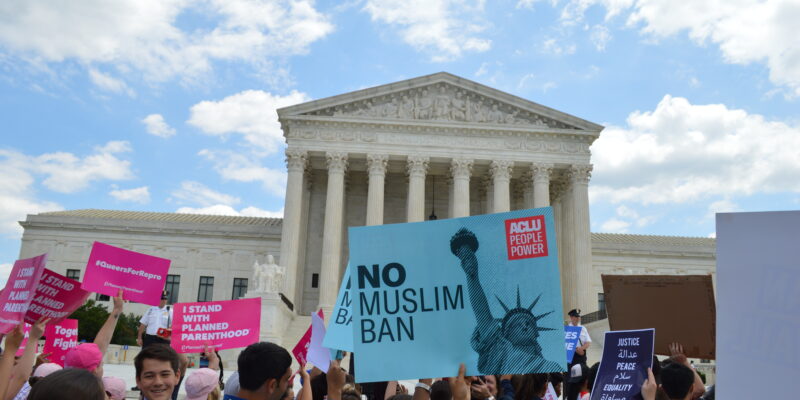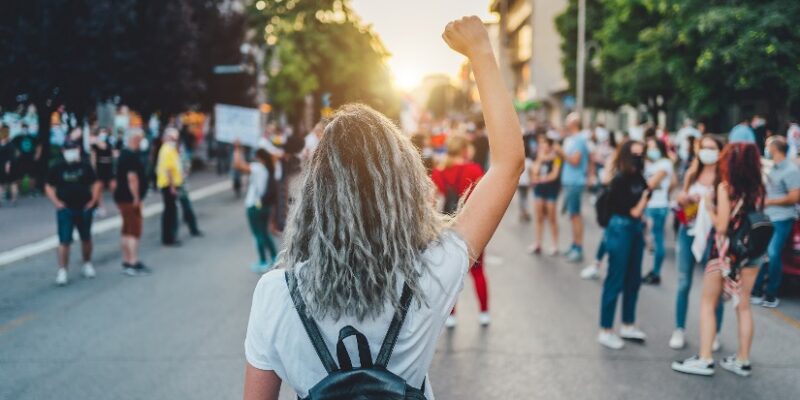
Taking Space, Making Space: How Organizations and Journalists Can Platform Diverse Voices in Peace and Security Media
Read about the tangible steps organizations and journalists can take in order to ensure a more diverse set of voices — in terms of both gender and race — get heard.
One day in early November, while finalizing that day’s edition of ReThink’s AM Nukes Roundup, I discovered that the only pieces that fit our scope for inclusion in the Russia-Ukraine war opinion section were written by men named David. Men regularly have written most, if not all, of the nuclear-focused opinion pieces that meet our selection criteria on a given day. A similar gender imbalance holds true for opinion pieces focused on the US’ post-9/11 wars.
The data backs up my observation. A 2018 study from Media Matters for America and Foreign Policy Interrupted looked at foreign policy and national security opinion pieces published in 1996, 2006, and 2016 in four major US newspapers. The study found that 85% of pieces were written by men, compared to only 15% by women (note: the study did not track pieces written by gender-diverse authors or identities beyond men and women). More recently, a ReThink Media audit of voiceshare in media coverage of nuclear warfare and weapons found that between 2011 and 2022, men wrote 72% of nuclear weapons and nuclear war-related op-eds.
The gender balance of experts quoted by journalists is also lopsided. According to a 2020-2021 study from the Global Media Monitoring Project (GMMP), men comprised 70% of sources and subjects in US newspaper, radio, and television news on politics and government. ReThink research in 2023 found an even starker divide in the nuclear space, with men accounting for a full 88% of quoted sources on nuclear weapons and war. When looking specifically at advocate sources, the percentage of men quoted was slightly lower, at 81%, ostensibly due to the community’s commitment to hiring and investing in women spokespeople in recent years. However, the research additionally found that just 6% of quotes from arms control and nonproliferation advocates came from women of color — a major growth point for our community. Across sources, voiceshare data that looks beyond the gender binary remains limited.
Women’s limited voiceshare in peace and security-focused media reinforces existing biases surrounding women’s expertise in the field. This creates a self-perpetuating cycle that further marginalizes women experts and the unique perspectives and solutions they bring. However, there are tangible steps organizations and journalists can take in order to ensure a more diverse set of voices — in terms of both gender and race — get heard.
What Makes an Expert
Who we see talk publicly about peace and security issues matters. The conscious and unconscious beliefs we form about who counts as an expert and who holds expertise on a given topic stem from what we read, watch, and listen to every day. When men dominate the opinion landscape or are overwhelmingly quoted as experts without parity from women experts, readers will come to assume that experts in the field are, for the most part, men. From this gender imbalance, some members of the public may infer that women must either not know enough about weapons, war, and peace to speak publicly on these issues or assume that women are simply uninterested in these topics. Our biases have consequences. Journalists who unconsciously perceive expertise as a male trait may not make an effort to seek out women experts. They may not even realize how few women they quote. An emerging women expert in nuclear arms control or the Pentagon budget may read an opinion page populated primarily by men and question whether outlets will view her expertise as worth publishing.
It matters just as much which women’s voices get heard as it does that women’s voices get heard at all. The inclusion of only white, wealthy women cannot and should not be equated to the progress of women writ large. Neglecting to highlight the expertise of large subsets of women will only feed the same cycle of bias, assumption, and exclusion that already acts as a barrier to so many.
Increasing Women’s Voiceshare
Both organizations and journalists can take tangible steps to increase women’s voiceshare in peace and security media. Organizational leadership can make and adhere to formal commitments to train and provide opportunities for junior and mid-level staff to take on public-facing roles. Making writing part of the job will ensure that these staffers have dedicated time to develop their voice, hone their expertise, and build a media portfolio. Creating opportunities for staff to write and publish will help your organization deepen its media footprint while encouraging individuals to feel confident as emerging experts. Senior staff can additionally invite more junior colleagues to co-write an op-ed to give them the chance to build their skills and their portfolio of work. Communications staff can also take care that when they pitch their colleagues to journalists, they’re pitching women and people of color in their organization as much as they’re pitching men.
Despite the flack then-Republican presidential nominee Mitt Romney took for his “binders full of women” remark back in 2012, resources exist for journalists to help diversify their sources. InterviewHer, the Women’s Media Center’s SheSource, the Diversity in National Security Network, Women Also Know Stuff, and People of Color Also Know Stuff all provide databases of diverse experts in the peace and security fields. The Op-Ed Project provides training and mentorship opportunities for underrepresented experts and pitches them to media gatekeepers across platforms. Additionally, ReThink Media regularly works with early-career women, gender-diverse individuals, and people of color to help them develop a media presence, and our staff are happy to connect journalists with emerging experts across the field.
Platforming a wider range of experts across a wider range of identities and experiences will ultimately allow peace and security media to reach a wider range of audiences and change the tenor and quality of debates in the field. We cannot feasibly address the challenges we face, from the continued prevalence of mass atrocity crimes to the threat of a new nuclear arms race, by asking the same people for the same solutions and analysis year after year. In order to see significant change in our world, we must welcome, cultivate, and adequately resource a diversity of voices.
Have any questions about ReThink’s nukes voiceshare analysis? Interested in partnering with ReThink on a media research project? Contact our research team at: analysis@rethinkmedia.org.


